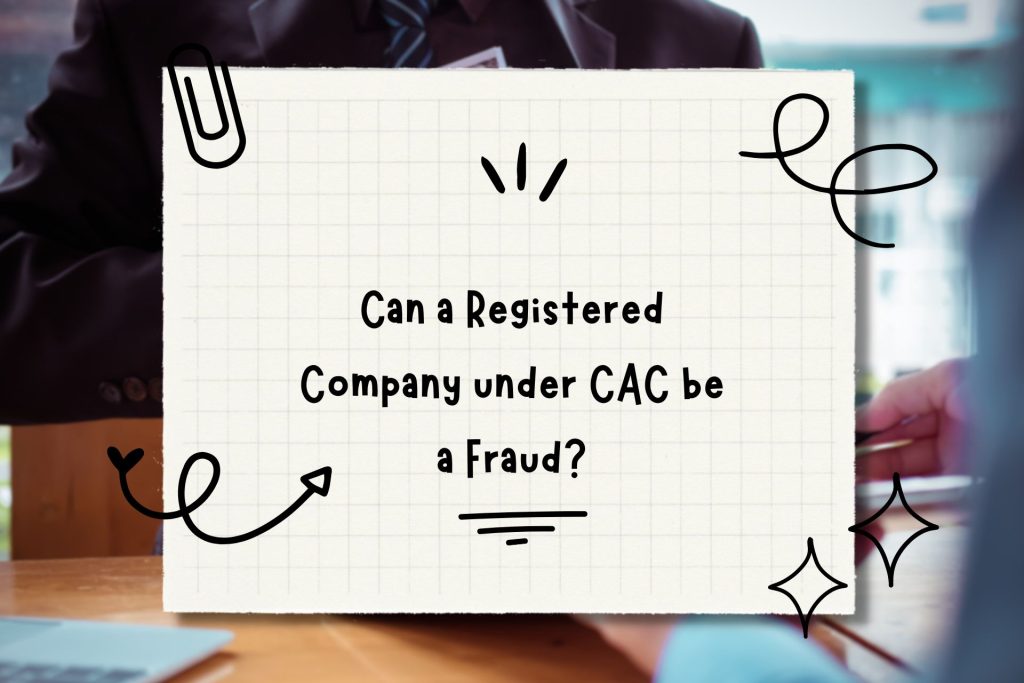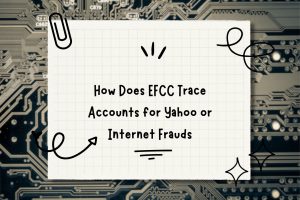As a business owner or potential investor in Nigeria, you may be wondering if a registered company under the Corporate Affairs Commission (CAC) can still be a fraud.
The short answer is yes, unfortunately, even a registered company under the Corporate Affairs Commission (CAC) can potentially engage in fraudulent activities.
While registering a company with the CAC is a legal requirement for doing business in Nigeria, it does not guarantee that the company is legitimate or trustworthy.
Key Takeaway
One reason why a registered company under CAC can be a fraud is due to the ease of registration. The CAC has made the process of registering a company in Nigeria relatively easy and straightforward.
Unfortunately, this also means that it is easy for fraudsters to register fake companies with the intention of scamming unsuspecting individuals or businesses. These fraudulent companies may have fake addresses, phone numbers, and even bank accounts, making it difficult for victims to track them down.
Another reason why a registered company under CAC can be a fraud is due to inadequate due diligence. The CAC is responsible for registering companies and ensuring that they comply with the relevant laws and regulations.
However, the CAC may not have the resources to conduct thorough background checks on every company that registers with them. This means that some fraudulent companies may slip through the cracks and be registered with the CAC.
What You Need to know About CAC Registration?

When it comes to registering a company in Nigeria, the Corporate Affairs Commission (CAC) is the regulatory body responsible for the registration and management of companies. In this section, you will see what the CAC does and what it takes to get your company on their books.
Recommended articles
The Role of the Corporate Affairs Commission
The CAC was established under the Companies and Allied Matters Act (CAMA) in 1990 to regulate the formation and management of companies in Nigeria. The commission is responsible for the registration of companies, business names, and incorporated trustees, as well as the regulation and supervision of their activities.
The CAC plays a vital role in ensuring that only legitimate businesses are registered in Nigeria. Before a company is registered, the CAC conducts a thorough investigation to ensure that the company is not fraudulent or engaged in any illegal activities.
Registration Process and Requirements
To register a company in Nigeria, there are certain requirements that must be met. These include:
- Choosing a unique company name that is not already registered with the CAC
- Providing a valid means of identification for the company’s directors and shareholders
- Providing a registered office address for the company
- Paying the necessary fees for registration
Once these requirements are met, the company can then proceed to register with the CAC. The registration process typically takes between 2 to 3 weeks, depending on the workload of the CAC.
It’s worth keeping in mind that even though CAC plays its part in keeping only legitimate businesses are registered in Nigeria, it is still possible for a registered company to engage in fraudulent activities. That’s why it’s crucial for individuals and businesses to exercise due diligence and conduct proper research before entering into any business transactions with a registered company.
Indicators of Fraudulent Activity
If you’re considering doing business with a registered company under the CAC, it’s important to be aware of the indicators of fraudulent activity. Here are some red flags to watch out for:
Red Flags in Company Operations
- Lack of transparency: If a company is not forthcoming with information about its operations, it could be a sign that they have something to hide. Be wary of companies that are evasive or non-responsive to your inquiries.
- Unprofessional conduct: A company that engages in unprofessional conduct, such as using aggressive sales tactics or making false promises, should be approached with caution.
- Lack of physical presence: If a company does not have a physical presence, such as an office or storefront, it could be a sign that they are not a legitimate business.
Financial Discrepancies and Irregularities
- Inconsistent financial statements: If a company’s financial statements do not add up or are inconsistent, it could be a sign that they are engaging in fraudulent activity.
- Unexplained expenses: If a company has unexplained or excessive expenses, it could be a sign that they are misusing funds.
- Unusual payment methods: If a company insists on using unusual or non-traditional payment methods, such as wire transfers or cryptocurrency, it could be a sign that they are trying to avoid detection.
It’s important to keep in mind that these indicators do not necessarily mean that a company is engaging in fraudulent activity, but they should serve as a warning to exercise caution and conduct further due diligence before doing business with them.
Legal Framework and Enforcement
Fraudulent activities are illegal and punishable under Nigerian law. The Companies and Allied Matters Act (CAMA) is the legal framework that regulates the formation, incorporation, and management of companies in Nigeria. The act also provides for the registration of business names, incorporated trustees, and other related matters.
Anti-Fraud Legislation
The Criminal Code Act and the Advance Fee Fraud and Other Fraud Related Offences Act are two of the most important pieces of legislation that deal with fraud in Nigeria. The Criminal Code Act provides for the punishment of fraud, while the Advance Fee Fraud and Other Fraud Related Offences Act specifically targets advance fee fraud, commonly known as “419 scams.”
The Economic and Financial Crimes Commission (EFCC) is the primary agency responsible for the enforcement of anti-fraud legislation in Nigeria. The EFCC is empowered to investigate, prosecute, and prevent economic and financial crimes, including fraud.
Enforcement by Regulatory Bodies
The Corporate Affairs Commission (CAC) is the regulatory body responsible for the registration and regulation of companies in Nigeria. The CAC has the power to investigate and sanction companies that engage in fraudulent activities.
In addition, sector-specific regulatory bodies such as the Securities and Exchange Commission (SEC) and the Central Bank of Nigeria (CBN) also have the power to investigate and sanction companies operating in their respective sectors.
All things considered, Nigeria’s legal setup provide a strong deterrent against fraudulent activities by registered companies. Companies must comply with the relevant laws and regulations to avoid legal and reputational risks.






